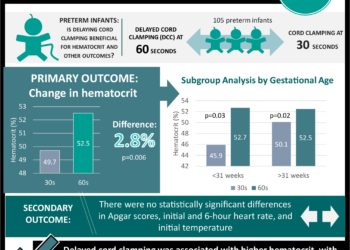Quick Take: Rates of extreme neonatal hyperbilirubinemia and kernicterus in children and adherence to national guidelines for screening, diagnosis, and treatment in Sweden
Neonatal hyperbilirubinemia, left untreated, may lead to lifelong neurodevelopmental impairment. Fortunately, effective tools in risk assessment, prevention, diagnosis and treatment exist, making this a very preventable condition. Despite this, cases of kernicterus do occur in high-resource settings. In this population-based nation-wide cohort study, data on the highest serum bilirubin level for all infants born alive at 35 weeks gestation or greater admitted for neonatal care in Sweden (2008-2016) was used to determine incidence rates of hazardous hyperbilirubinemia and kernicterus in this patient population, and to evaluate adherence to best practices. Among 992,378 live-born infants for which data was available, 494 infants developed extreme hyperbilirubinemia (serum bilirubin levels 25.0-29.9 mg/dL or 425-509 μmol/L). The incidence of hazardous hyperbilirubinemia (serum bilirubin levels ³30.0 mg/dL or ³510 μmol/L) and kernicterus was 6.8 per 100,000 infants and 1.3 per 100,000 infants, respectively. Among the 13 children in the study that developed kernicterus, brain injury was assessed as being potentially avoidable for 11 children. This was on the basis of the presence of 1 or several of the following possible causes, including untimely or lack of pre-discharge bilirubin screening (n= 6), misinterpretation of bilirubin values (n= 2), untimely or delayed initiation of treatment with intensive phototherapy (n=1), untimely or no treatment with exchange transfusion (n= 6), or lack of repeated exchange transfusions despite indication (n = 1). This study demonstrates that hazardous hyperbilirubinemia in near-term or term newborns still occurs in high-resource settings. In cases where this leads to disabling neurodevelopmental impairment, non-compliance with best practices is often identified as a contributor. While the incidence is low, these findings have important implications for improving adherence to best practice guidelines.
Click to read the study JAMA Network Open
Image: PD
©2019 2 Minute Medicine, Inc. All rights reserved. No works may be reproduced without expressed written consent from 2 Minute Medicine, Inc. Inquire about licensing here. No article should be construed as medical advice and is not intended as such by the authors or by 2 Minute Medicine, Inc.






